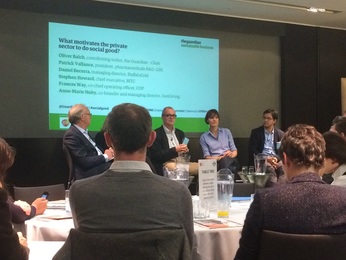
It was timed to coincide with the launch of the Sustainable Development Goals (SDGs) and on top of the panel debate, each of the five tables in the audience were assigned a fictional company and asked to identify how we would convince our boards that we should actively work to support SDG 10 – reducing inequality within and among countries.
There will be a write up in the Business section of The Guardian on the 13th of October so look out for a full synopsis then, but a few points that really resonated with me during the debate are summarised below:
- Quarterly pressures: there was a lot of debate around how ‘doing good’ sits with the quarterly financial targets and pressures of publically listed companies, with people in the room suggesting that even Paul Polman at Unilever can’t get a away with too many poor quarters in the short term. How do we get investors to start taking a longer term view? Frances Way suggested that we need to engage the asset owners more, rather than the asset managers – if you are a pension fund the value of that fund in 30 years’ time is crucial.
- All business models should be inherently good to thrive in the long run: Stephen Howard argued that businesses exist first and foremost to solve a problem. They need profit the same way humans need oxygen – it is critical but not the purpose of their existence.
- Changing customer behaviour: Howard also argued that the real difference companies can make is to change how their customers behave through their products and services – something I wrote about last year.
- Regulation is good, but only if implemented well and with the right parameters (with the Social Value Act held up as good example of a missed opportunity). There was broad agreement that good regulation will help those at the forefront of innovation, something Gavin Warner of Unilever confirmed earlier this year at the Re-Thinking Progress conference.
- NGOs are great at spotting opportunities and innovation but not always at doing ‘scale’. Anne-Marie Huby made a strong case for corporate-NGO partnerships with this really insightful statement.
- Choice editing: there was a question from a Sainsbury’s employee in the audience about whether they should be doing more choice editing as they already do with bananas for example (they only sell fair-trade). There was broad agreement that retailers should be doing this as customers often want to do right but simply don’t have the time to read every label.
- You can communicate to half a billion of the poorest people in the world by text message. Daniel Becerra highlighted that of the 1.2bn poorest people in the world who have no access to electricity, 600m have a mobile phone. This is potentially a very powerful tool to get mass health and other important messages out quickly and widely.
- Flat organisation structures drive innovation: Becerra also highlighted that the flat organisational structure and empowerment of staff at BuffaloGrid has been a catalyst for creativity and innovation, a belief I have long held.
by Jesper Ekelund
|
|
|


 RSS Feed
RSS Feed